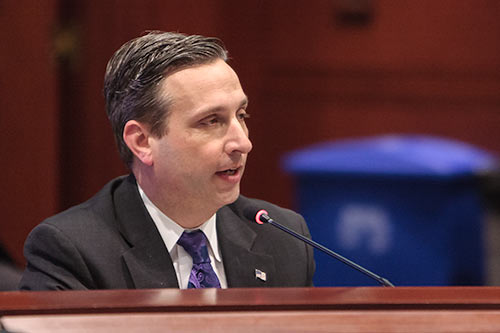Senate Majority Leader Duff: If internet service providers have no interest in throttling internet speeds and forcing customers to pay for content, then why have they fought net neutrality so much?

Senate Majority Leader Bob Duff (D-Norwalk) today spoke in support of net neutrality at an informational meeting of the General’s Assembly’s Energy and Technology Committee.
Speaking from the perspective of consumers and constituents, Senator Duff said, “We have spent a lot of time in this state trying to spur creativity and create more entrepreneurs. Without net neutrality principles, entrepreneurs working online in our state will face a significant hurdle. Our established businesses will have to pay more. And our consumers in the state will have to make choices they don’t have to now. One question I would like everyone to ask themselves is this: if internet service providers have no interest in throttling internet speeds and forcing customers to pay for content, then why have they fought net neutrality so much?”
“This is about a free and open internet. And this is about a few internet service providers being able to control who sees what and how fast they see it,” said Senator Duff.
During the Obama administration, the FCC voted to adopt strong, open internet rules to ensure that Americans reap the economic, social and civic benefits of an open internet, including the preservation of net neutrality.
Following the December 2017 announcement by the Federal Communications Commission’s (FCC) announcement that they were rolling federal net neutrality rules, Senator Duff announce that he would introduce legislation during the 2018 legislative session of the General Assembly aimed at protecting Connecticut businesses and consumers
Senator Duff has introduced Senate Bill 2 to hold companies to their commitments not to block websites, throttle speeds, or impose prioritization pricing and to establish a process for internet service providers to certify that they will not engage in practices inconsistent with net neutrality principles.
Included in Senate Bill 2 will be language to hold companies accountable for warranties made to consumers as well as amend Connecticut’s consumer protection laws to include the principles of net neutrality.
Share this page:
